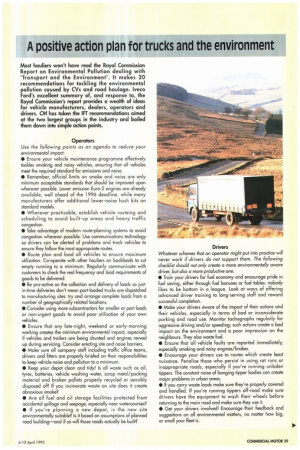A positive action plan for trucks and the environment
Page 41

If you've noticed an error in this article please click here to report it so we can fix it.
Most hauliers won't have read the Royal Commission Report on Environmental Pollution dealing with 'Transport and the Environment'. It makes 20 recommendations for tackling the environmental pollution caused by CVs and road haulage. Iveco Ford's excellent summary of, and response to, the Royal Commission's report provides a wealth of ideas for vehicle manufacturers, dealers, operators and drivers. CM has taken the IFT recommendations aimed at the two largest groups in the industry and boiled them down into simple action points.
Operators
Use the following points as an agenda to reduce your environmental impact: • Ensure your vehicle maintenance programme effectively tackles smoking and noisy vehicles, ensuring that all vehicles meet the required standard for emissions and noise.
• Remember, official limits on smoke and noise are only minimum acceptable standards that should be improved upon wherever possible. Lower emission Euro-2 engines are already available, well ahead of the 1996 deadline, while many manufacturers offer additional lower-noise hush kits on standard models.
• Wherever practicable, establish vehicle routeing and scheduling to avoid built-up areas and heavy traffic congestion.
• Take advantage of modern route-planning systems to avoid congestion wherever possible. Use communications technology so drivers can be alerted of problems and track vehicles to ensure they follow the most appropriate routes.
• Route plan and load all vehicles to ensure maximum utilisation. Co.-operate with other hauliers on backloads to cut empty running to a minimum. Regularly communicate with customers to check the real frequency and load requirements of goods to be delivered.
• Be pro-active on the collection and delivery of loads so justin-time deliveries don't mean part-loaded trucks are dispatched to manufacturing sites: try and arrange complete loads from a number of geographically related locations.
• Consider using more subcontractors for smaller or part loads or non-urgent goods to avoid poor utilisation of your own vehicles.
• Ensure that any late-night, weekend or early-morning working creates the minimum environmental impact, especially if vehicles and trailers are being shunted and engines revved up during servicing. Consider erecting site and noise barriers.
• Make sure all company staff including traffic office teams, drivers and fitters are properly briefed on their responsibilities to keep vehicle noise and pollution to a minimum.
• Keep your depot clean and tidy! Is all waste such as oil, tyres, batteries, vehicle washing water, scrap metal/packing material and broken pallets properly recycled or sensibly disposed of? If you incinerate waste on site does it create obnoxious smoke?
• Are all fuel and oil storage facilities protected from accidental spillage and seepage, especially near watercourses?
• If you're planning a new depot, is the new site environmentally suitable? Is it based on assumptions of planned road building—and if so will those roads actually be built? Whatever schemes that an operator might put into practice wilt never work if drivers do not support them. The following checklist should not only create a more environmentally aware driver, but also a more productive one.
• Train your drivers for Fuel economy and encourage pride in fuel saving, either through fuel bonuses or fuel tables: nobody likes to be bottom in a league. Look at ways of offering advanced driver training to long-serving staff and reward successful completion.
• Make your drivers aware of the impact of their actions and their vehicles, especially in terms of bad or inconsiderate parking and road use. Monitor tachographs regularly For aggressive driving and/or speeding; such actions create a bad impact on the environment and a poor impression on the neighbours. They also waste fuel.
• Ensure that all vehicle faults are reported immediately, especially smoking and noisy engines/brakes.
• Encourage your drivers use to routes which create least nuisance. Penalise those who persist in using rat runs or inappropriate roads, especially if you're running unladen tippers. The constant noise of banging tipper bodies can create major problems in urban areas.
• If you carry waste loads make sure they're properly covered and handled. If you're running tippers off-road make sure drivers have the equipment to wash their wheels before returning to the main road and make sure they use it.
• Get your drivers involved! Encourage their feedback and suggestions on all environmental matters, no matter how big, or small your fleet is.




























































































